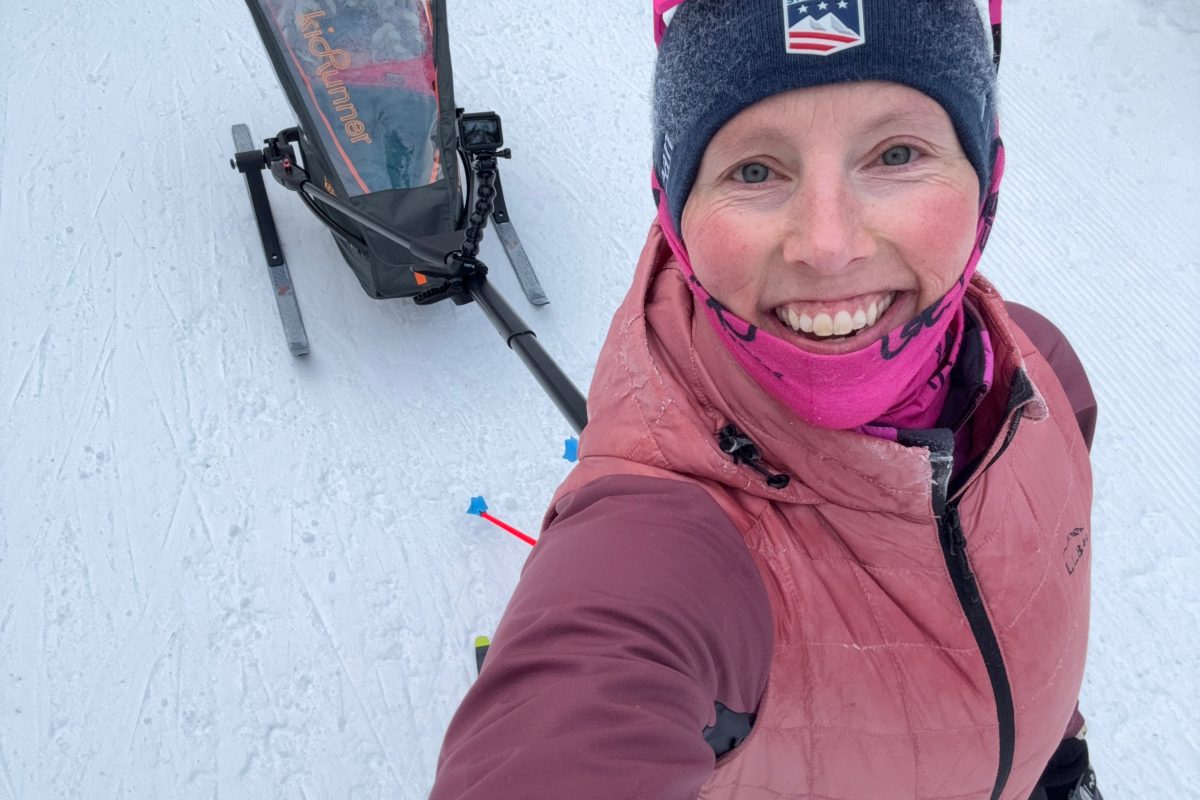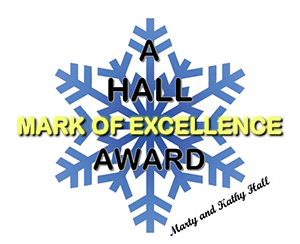 This coverage is made possible through the generous support of Marty and Kathy Hall and A Hall Mark of Excellence Award. To learn more about A Hall Mark of Excellence Award, or to learn how you can support FasterSkier’s coverage, please contact info@fasterskier.com.
This coverage is made possible through the generous support of Marty and Kathy Hall and A Hall Mark of Excellence Award. To learn more about A Hall Mark of Excellence Award, or to learn how you can support FasterSkier’s coverage, please contact info@fasterskier.com.
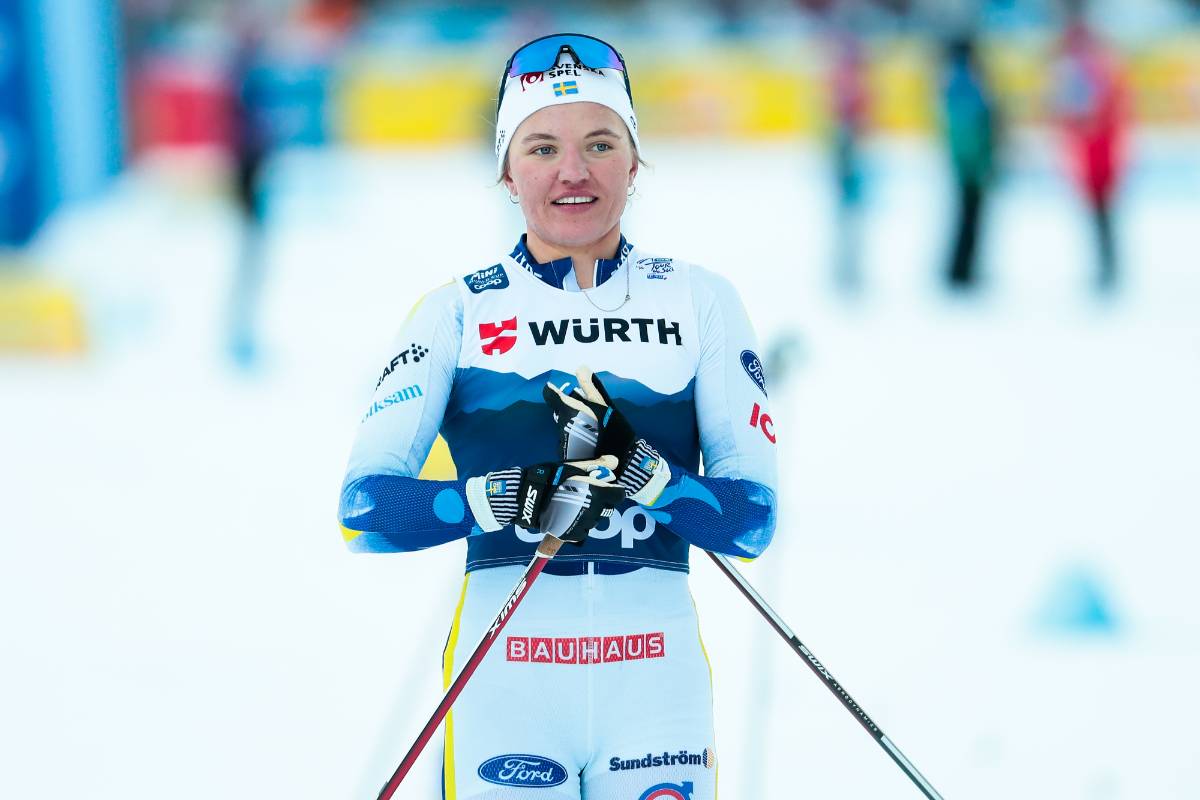
Over eighteen editions, the rhythms of the Tour de Ski have become familiar for the World Cup for both skier and viewer alike. The stark change of scenery from the arctic fields and fjords of Northern Europe in Period I to the mountain valleys of Southern Europe indicates that the stakes have been raised right alongside the topography. Seven stages, contested over nine exhausting days, create an event whose stature grows with each passing year, following paths to victory forged by skiing’s greats.
Toblach played host to this year’s first Tour de Ski skate sprint stage. A fixture since the discipline was first pioneered in the early 2000s, the Toblach Sprint course has played an outsized role in garnering Sprint racing’s reputation as a tactical discipline that highlights not just the outright physical speed of the world’s greatest skiers, but the thoughtfulness with which they race, too. The Toblach course, “is really windy and punchy,” said Rosie Brennan (USA) on the skate sprint she raced today, “which makes it difficult to pass and requires really quick acceleration,” This year, the final stretch that rewarded drafting for many previous years was tempered by a chicane, but one that didn’t temper the overall effect. Sweden’s Linn Svahn mixed cunning and physical prowess throughout the entire day, earning her first individual World Cup win in nearly three years to open this year’s Tour de Ski. She was followed onto the podium by her teammate, Jonna Sundling, and Norwegian sprint specialist, Kristine Stavaas Skistad.
For the Americans, it was Diggins qualifying second. And with promising early-season results in sprinting, there was an early opportunity to gain some advantage over other rivals in chasing her second Tour de Ski victory. She would be joined in the last quarterfinal of the day by sixth place qualifier Julia Kern (USA), with Rosie Brennan (USA) skiing out of the fourth quarterfinal to round out the three heat qualifiers for the Americans during Stage 1. Ultimately, Diggins would finish ninth, Kern 11th, and Brennan 27th.
The only Canadian competitor—Katherine Stewart-Jones—finished qualifying in an uncharacteristic 64th.
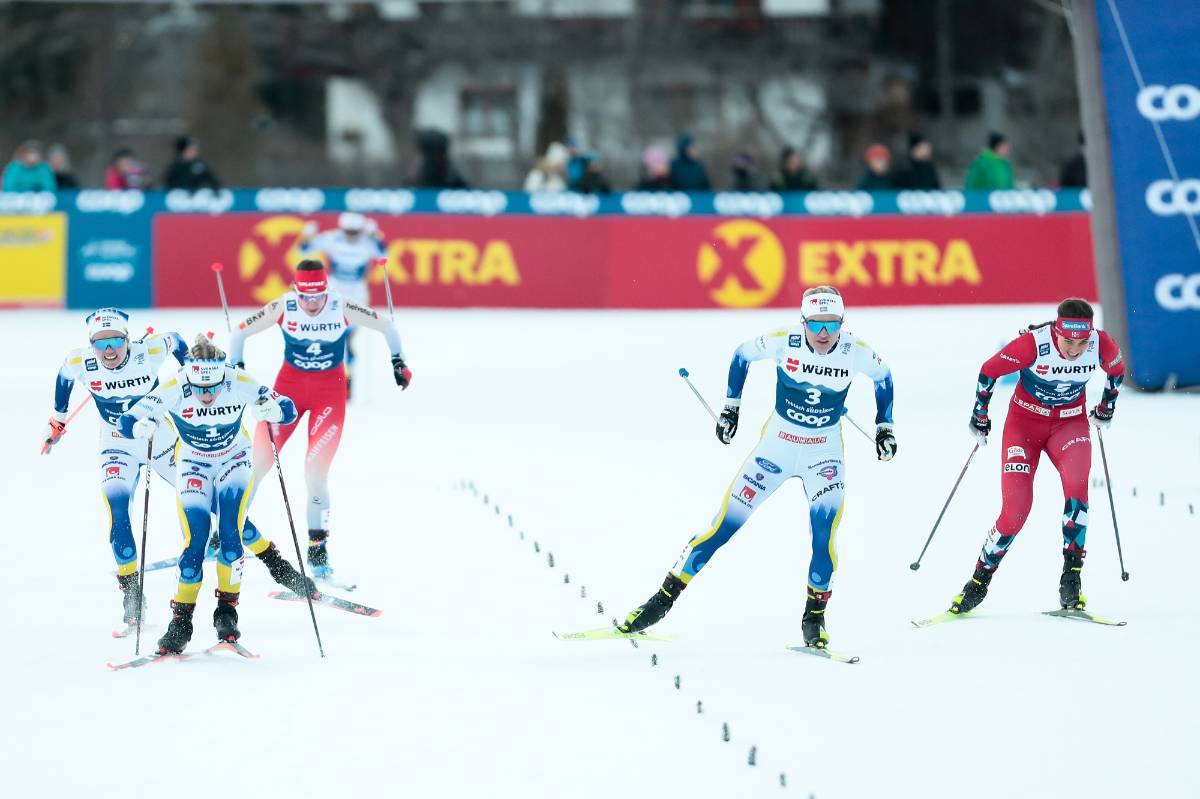
Svahn’s win capped an early season, and early career renaissance. At 24 years old, she already has experienced the full depth of skiing’s highs and lows, scoring perennial Sprint wins on the World Cup for two years in both 2019-2020 and 2020-2021, before a shoulder injury led to a long recovery. She won today by outsprinting the entire current crop of top sprint contenders. The win puts Svahn into the yellow bib of the Tour de Ski’s Overall leader going into Sunday’s 10 k Classic Interval Start race.
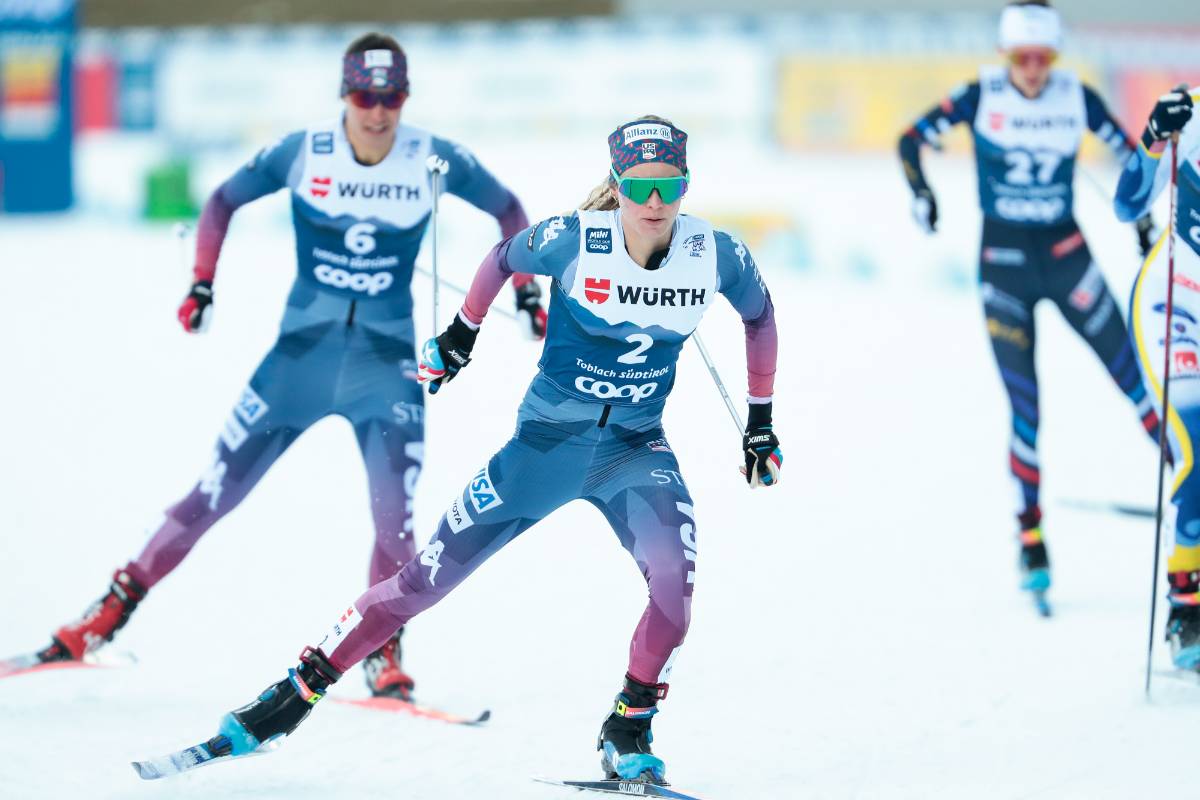
Diggins Starts Strong in Tour de Ski Overall Chase
Diggins came into the 2024 Tour de Ski as the leader of the World Cup’s Overall classification; however, that didn’t come with the usual Yellow bib that the World Cup leader wears. Instead, last year’s Tour de Ski winner Karlsson (SWE) was in Yellow. Both Diggins and Karlsson would advance out of qualifying.
Before Diggins would take to the quarterfinal, the Swedish-Norwegian duo of Sundling and Skistad would lead a hard-driving quarterfinal alongside Frida Karlsson that saw the Yellow bib finish in third. The second quarterfinal produced a lucky loser in Estonia’s Patricija Eiduka, so Karlsson would be on the outside looking in for the semi-finals. Karlsson would finish Stage 1 in 14th place.
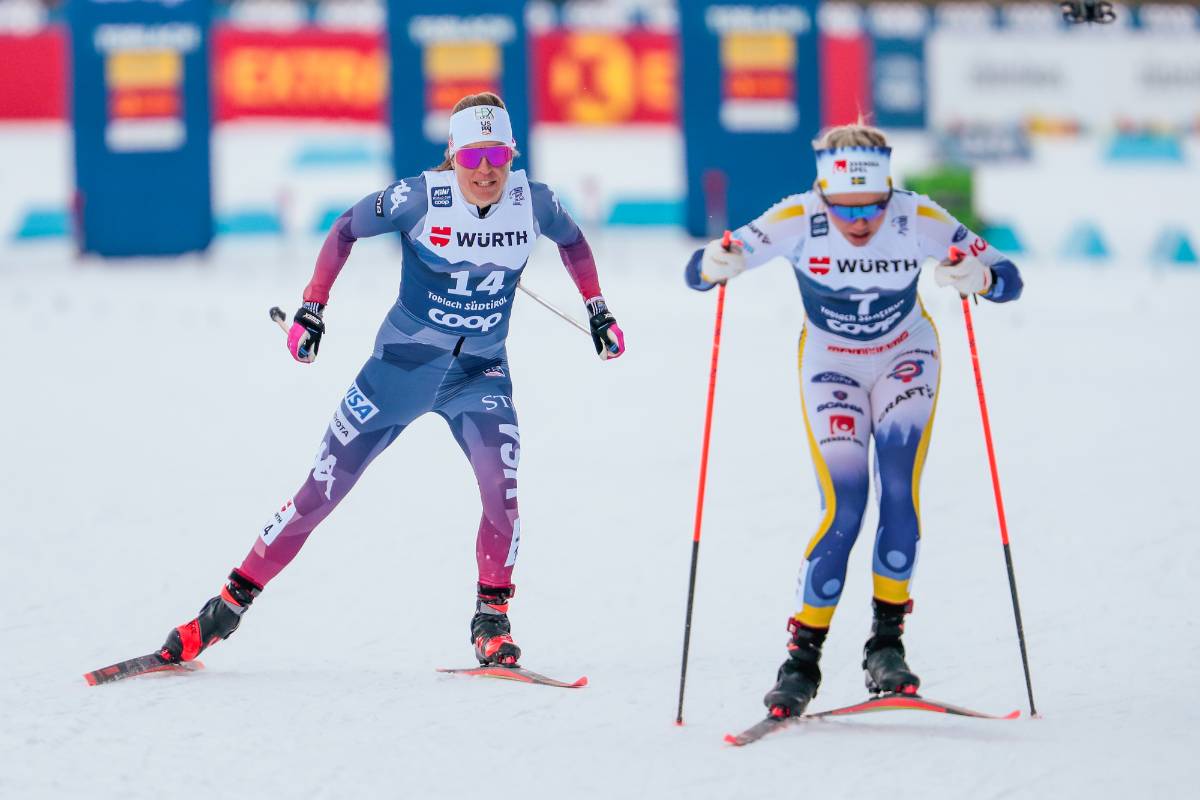
When the fifth quarterfinal featuring Jessie Diggins and Julia Kern started on course, Diggins was in a good spot to gain an early advantage over other Overall contenders. She skied with the intention to take the chance early, driving the pace from the start. Kern remained steady behind Diggins, and the two kept together through pulses and pushes along the course’s undulating terrain. Norway’s Mathilde Myhrvold was the only other skier in the field capable of following the Americans’ driving pace. In the closing moments of the heat, Kern relented ever-so-slightly, and the Norwegian shot up the final stretch to put in a boot throw for the second semifinal spot behind heat winner, Diggins. Following Diggins’ pace had paid off for Kern; she was into the semifinal as the first lucky loser.
“The tactic in the quarterfinal was, ‘ok, let’s pick this one’ and hopefully [Julia and I] could scare some people out of picking that heat, which worked,” said Diggins in post-race comments. Kern echoed the sentiment, saying “Jessie and I talked beforehand and we wanted to string it out so it didn’t come down to a sprint in the end.”
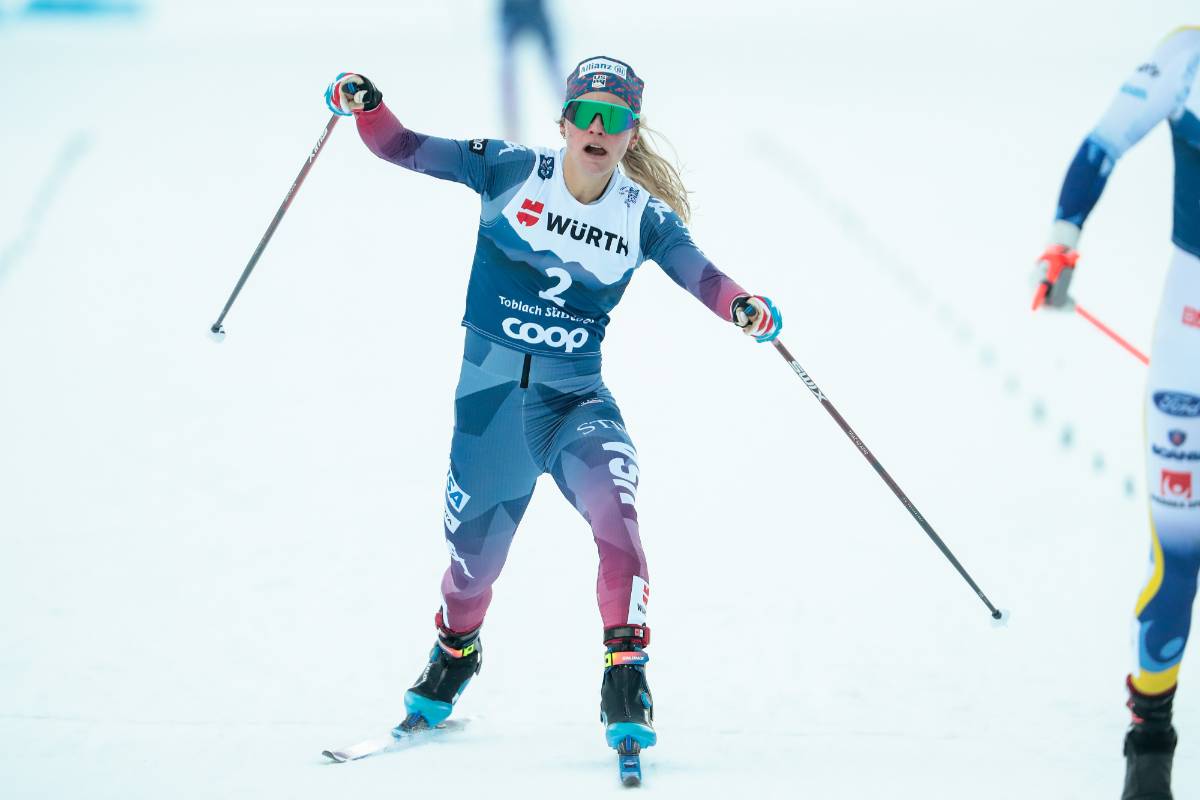
The American pair would advance to the second semifinal together. Diggins led the heat out hard alongside the Swedish pair of Emma Ribom and Johanna Haeggstroem; Kern fell off the back early. Diggins would push over the course’s decisive International Bridge hill coming out of the first lap, but the Swede’s were able to mark her. Off the final corner, Diggins forged a middle path between the Swede’s, but was unable to keep up with their finishing push. Diggins finished the heat in fifth, giving her a ninth place finish, and seventh Overall in the Tour de Ski after Stage 1 (See the section below on how that placings-discrepancy is possible).
Kern described the semifinal in post race interviews. “[It] was a pretty similar [to the quarterfinal],” she said. “But I was pretty worked from the last heat.”
“I was not aggressive enough [in my semi-final],” said Diggins. “I just didn’t hold my line well enough, and I wish I could do that one over . . . In general, though, I’m really happy with how I skied. The fitness is right where it needs to be.”
The other semifinal saw a tactically savvy Svahn waiting patiently, marking Sundling, and ultimately sprinting around her to first. Sundling secured second in a photo finish over Kristine Stavaas Skistad, with last year’s World Cup Sprint runner-up, Nadine Faehndrich (SUI), getting the second lucky loser spot to round out the Finals field. The semifinals importance to the Tour de Ski Overall was that Victoria Carl finished the heat in sixth place, and 12th in Stage 1. That left Jessie Diggins (seventh) furthest up the Tour de Ski standings of the main contenders for this year’s Overall, with a 10 k Classic race to follow tomorrow.
Tour de Ski Standings After Stage 1
Svahn will wear the Yellow bib into Tour de Ski Stage 2 with a two second lead over today’s second place finisher, Sundling and a time of 1:55.
Math matters at the Tour de ski, so it’s worth reviewing Page 43 of your handy FIS World Cup Rule Book. For Tour de Ski sprint races, times are passed on qualifying results, but time bonuses are calculated off the heat results. Therefore, Stage 1 results do not necessarily equate to Tour de Ski standings after Stage 1.
Linn Svahn’s time Overall time comes from her qualifying time (see Qualifying Results here) , 2:55.01, which is first truncated to the nearest second before each successive stage, hence 2:55. Then, she earned a 60 second time bonus for her Sprint heat finish position, 1st place, so 2:55 – 1:00 = 1:55, and 1st place in the Tour de Ski Overall. Stage 1 second place finisher Sundling qualified in first with a time of 2:51, and earned a 54 second time bonus for her place in the Finals, so is two seconds off Svahn with a 1:57.
For Diggins, her second-best qualifying time of 2:54, plus a time bonus of 28 seconds for her ninth place heat finish equates to 2:26 (+0:31), seventh place in the Tour de Ski Overall. Kern also is in the top ten of the Tour de Ski Overall, moving up from 11th on Stage 1 with bonuses to 10th Overall (+0:39). Rosie Brennan is in 26th (+1:01).
Note the parentheses there, as it’s how a three-minute sprint race with split second time gaps translates into the Overall dynamic that will now be raced out over the next week. Going into tomorrow’s 10 k classic, Diggins is roughly 30 seconds off the Yellow Bib, while Brennan is roughly one minute off the same mark. Those are some handy marks for viewers to consider as racers approach tomorrow’s first distance-racing challenge: the 10 k Classic Interval Start.
Stage 1 Tour de Ski RESULTS
Overall Tour de Ski STANDINGS
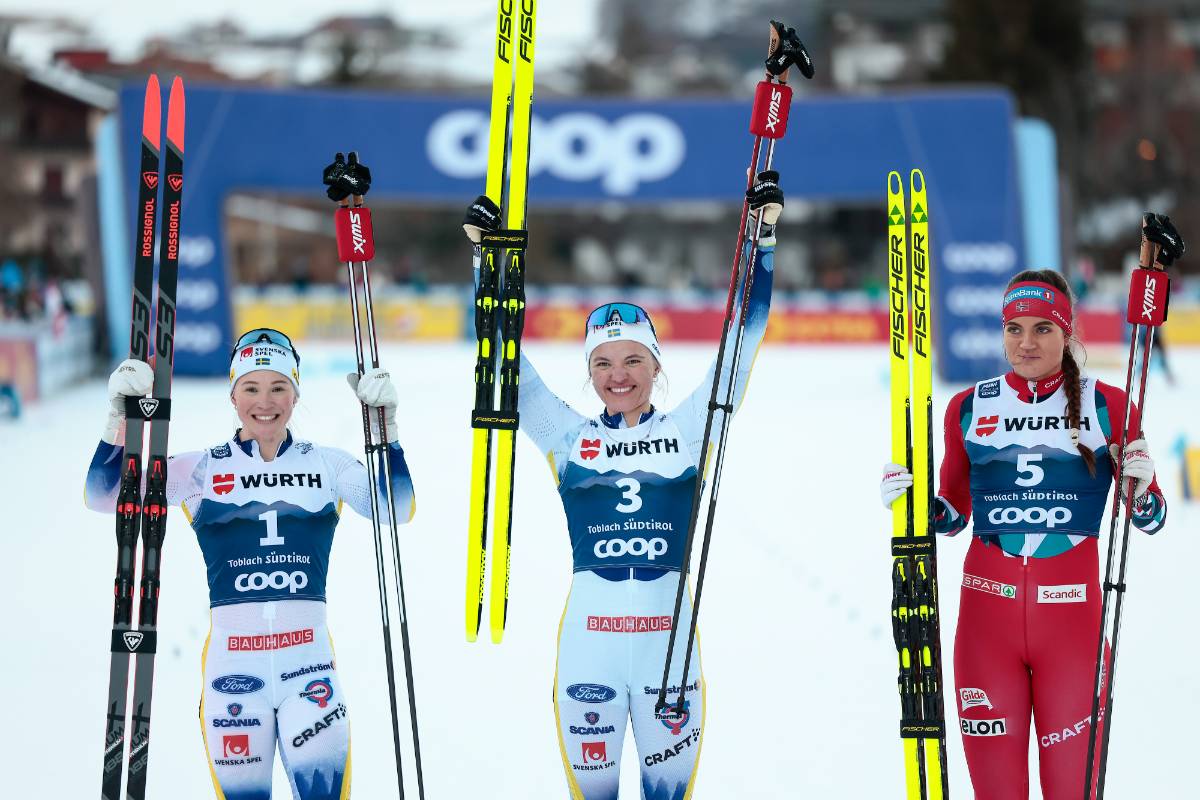
Ben Theyerl
Ben Theyerl was born into a family now three-generations into nordic ski racing in the US. He grew up skiing for Chippewa Valley Nordic in his native Eau Claire, Wisconsin, before spending four years racing for Colby College in Maine. He currently mixes writing and skiing while based out of Crested Butte, CO, where he coaches the best group of high schoolers one could hope to find.

